Wenn Sie ein Plugin finden, das perfekt für Ihre Bedürfnisse zu sein scheint, aber nicht als kompatibel mit Ihrer WordPress-Version gekennzeichnet ist, ist es natürlich, sich unsicher zu fühlen. Sie könnten sich Sorgen über potenzielle Konflikte oder sogar über den Ausfall Ihrer Website machen.
Unsere Leser fragen uns oft, ob es sicher ist, WordPress-Plugins zu verwenden, die nicht mit ihrer aktuellen Version getestet wurden. Die Erfahrung hat uns gelehrt, dass die sichere Antwort lautet: „Es kommt darauf an.“ Die Situation ist jedoch nicht immer so riskant, wie sie scheint.
Sie sehen, WordPress aktualisiert seine Kernsoftware regelmäßig, um die Sicherheit zu verbessern, Funktionen hinzuzufügen und Fehler zu beheben. Plugin-Entwickler versuchen, mit diesen Änderungen Schritt zu halten, aber manchmal gibt es eine Verzögerung beim Testen und Aktualisieren ihrer Plugins
In diesem Artikel besprechen wir, ob Sie Plugins, die nicht mit der aktuellen Version von WordPress getestet wurden, sicher installieren können. Unser Rat basiert auf jahrelanger Erfahrung im Testen von Plugins, der Verwaltung von WordPress-Websites und der Unterstützung echter Benutzer.
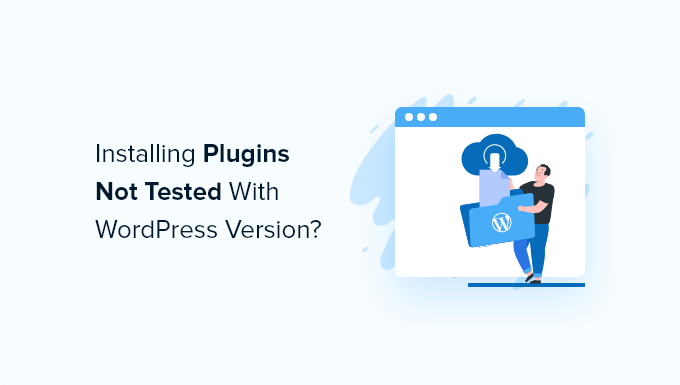
Woher bezieht WordPress die Information „Plugin nicht getestet“?
Fragen Sie sich, wie WordPress weiß, ob ein Plugin mit Ihrer WordPress-Version getestet wurde oder wer für dessen Testung verantwortlich ist?
Wenn Plugins im WordPress-Plugin-Verzeichnis eingereicht werden, müssen Autoren eine „readme“-Datei zusammen mit ihrem Plugin beifügen. Diese Datei wird von WordPress verwendet, um die Seite mit den Details zum Plugin zu erstellen.
Plugin-Autoren sind dafür verantwortlich, ihr Plugin mit der neuesten Version von WordPress zu testen und die Versionsnummer in ihrer Readme-Datei manuell zu aktualisieren.
Wenn Sie die Meldung „Dieses Plugin wurde nicht mit der neuesten Version von WordPress getestet“ sehen, bedeutet dies, dass der Plugin-Autor die Readme-Datei nicht mit der neuesten WordPress-Versionsnummer aktualisiert hat.
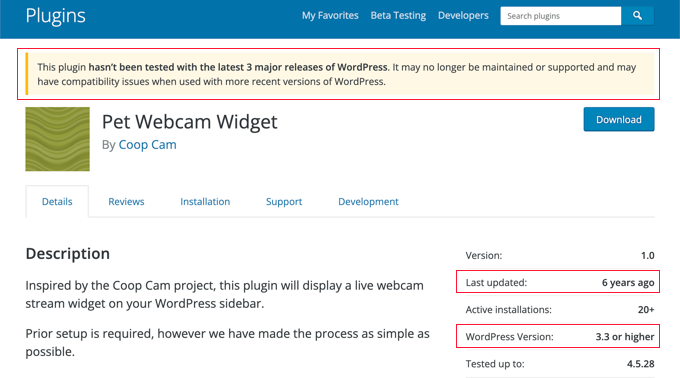
Das bedeutet nicht unbedingt, dass das Plugin WordPress-Fehler verursacht.
Warum aktualisieren WordPress-Plugin-Autoren die Readme-Dateien nicht?
Manchmal aktualisieren Plugin-Autoren ihre Readme-Dateien nicht, selbst wenn sie ihr Plugin für die Arbeit mit jeder neuen WordPress-Version testen.
In einer idealen Welt würden diese Informationen jedes Mal aktualisiert, wenn ein Plugin auf Kompatibilität mit dem neuesten WordPress-Update getestet wird.
Viele Entwickler sind jedoch normalerweise mit bezahlten Entwicklungsprojekten beschäftigt. Da die Plugins im WordPress-Plugin-Repository kostenlos sind, gibt es für die Entwickler weniger Anreize, Plugins und die Readme-Datei ständig auf dem neuesten Stand zu halten.
Sollten Sie WordPress-Plugins installieren, die nicht getestet wurden?
Die kurze Antwort lautet: Es kommt auf das Plugin an.
Nur weil ein Plugin-Autor seine Readme-Datei nicht aktualisiert hat, bedeutet das nicht, dass das Plugin nicht getestet wurde und nicht mit der neuesten Version von WordPress funktioniert.
Größtenteils hängt es von der Funktionalität des Plugins und dessen Komplexität ab. Es gibt zum Beispiel einfache Plugins, die sich direkt in den WordPress-Kern einklinken und jahrelang nicht aktualisiert werden müssen, um ordnungsgemäß zu funktionieren.
Die Meldung „nicht getestet“ bedeutet nicht, dass das Plugin Probleme oder Sicherheitsprobleme hat. Sie besagt lediglich, dass der Entwickler das Plugin nicht kürzlich getestet oder die Readme-Datei aktualisiert hat.
Hier bei WPBeginner empfehlen wir unter bestimmten Umständen die Installation von Plugins, die nicht mit der neuesten Version von WordPress getestet wurden. Wir testen das Plugin gründlich, um sicherzustellen, dass es wie vorgesehen funktioniert.
Wenn Sie einen unserer kürzlich veröffentlichten WordPress-Tutorials lesen, bedeutet dies, dass das Plugin zum Zeitpunkt unseres Tests mit der neuesten Version von WordPress kompatibel war.
Eine weitere Möglichkeit zu prüfen, ob Sie das Plugin installieren sollten, ist der Besuch der Plugin-Entwicklerseite. Dies zeigt Ihnen, wie aktiv der Plugin-Entwickler ist.
Gehen Sie einfach zur WordPress-Plugin-Seite und klicken Sie auf den Tab „Entwicklung“.
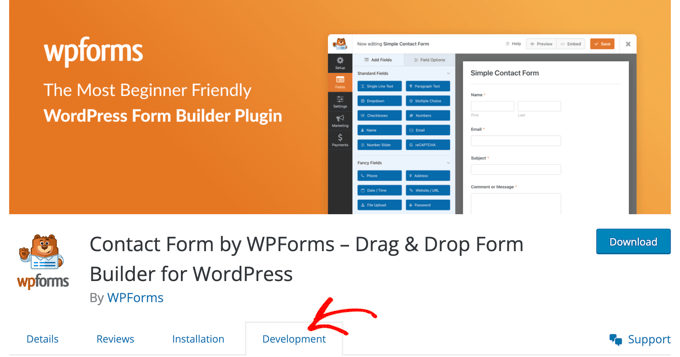
Hier können Sie im Abschnitt „Changelog“ sehen, wann das Plugin zuletzt aktualisiert wurde und welche Änderungen und Verbesserungen kürzlich am Plugin vorgenommen wurden.
Wenn der Entwickler das Plugin aktiv aktualisiert, bedeutet dies normalerweise, dass das Plugin von hoher Qualität und sicher für Ihre WordPress-Website ist.
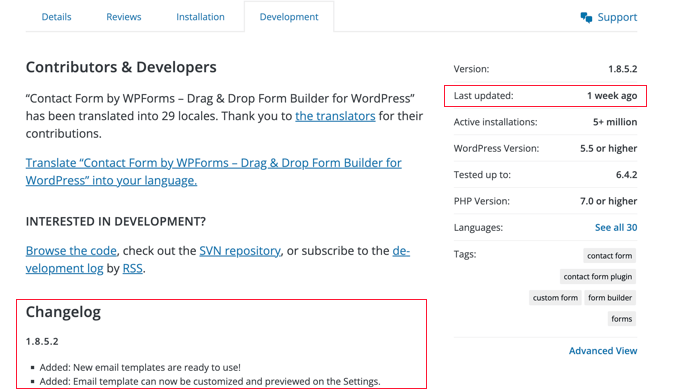
Andererseits bedeutet es oft, dass ein Plugin aufgegeben wurde, wenn es seit mehr als zwei Jahren nicht aktualisiert wurde. In diesem Fall sollten Sie das Plugin nicht installieren, da der Entwickler es nicht aktiv wartet.
Sie können auch auf den Reiter „Bewertungen“ klicken, um andere Meinungen und Beschwerden über Inkompatibilität zu sehen.
Wenn die Bewertungen aktuell und fünf Sterne sind, dann kann man davon ausgehen, dass Sie das Plugin auf Ihrer Website verwenden können.
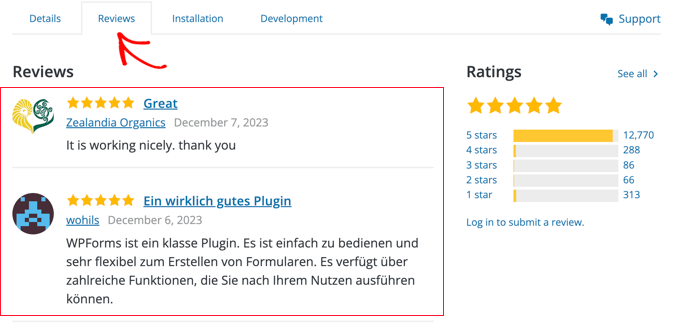
Schließlich können Sie das Plugin auf einer lokalen WordPress-Installation testen. So können Sie feststellen, ob es Probleme oder Konflikte gibt, ohne Ihre Hauptwebsite zu beeinträchtigen.
Expertenanleitungen zur WordPress-Sicherheit
Wir hoffen, dieser Artikel hat Ihnen geholfen zu erfahren, ob Sie Plugins installieren sollten, die nicht mit Ihrer WordPress-Version getestet wurden. Möglicherweise möchten Sie auch einige andere Artikel lesen, die sich mit der Sicherheit Ihrer WordPress-Website befassen:
- Ist es sicher, veraltete WordPress-Plugins zu verwenden? (Erklärt)
- Sollte ich WordPress-Plugins die Erlaubnis geben, Daten zu sammeln?
- Gründe, warum Sie Nulled WordPress Themes & Plugins unbedingt vermeiden müssen
- Sollten Sie Plugin-Entwicklern Administratorzugriff gewähren, um Fehler zu beheben?
- So deinstallieren Sie ein WordPress-Plugin richtig (Anfängerleitfaden)
- So verschieben Sie WordPress richtig von HTTP zu HTTPS (Anfängerleitfaden)
- So scannen Sie Ihre WordPress-Site auf potenziell bösartigen Code
- Die besten WordPress-Sicherheits-Plugins zum Schutz Ihrer Website (im Vergleich)
- So führen Sie eine WordPress-Sicherheitsprüfung durch (vollständige Checkliste)
- Der ultimative WordPress-Sicherheitsleitfaden (Schritt für Schritt)
Wenn Ihnen dieser Artikel gefallen hat, abonnieren Sie bitte unseren YouTube-Kanal für WordPress-Video-Tutorials. Sie finden uns auch auf Twitter und Facebook.





Mrteesurez
Danke für die Einblicke! Früher habe ich Plugins gemieden, die nicht mit der neuesten WordPress-Version getestet wurden, aus Angst, sie könnten Probleme verursachen. Ich habe jedoch erkannt, dass die Konzentration auf die Funktionalität und die Bewertungen des Plugins wichtiger ist. Ich habe erfolgreich mehrere Plugins installiert, die als „nicht mit Ihrer aktuellen Version getestet“ markiert waren, und festgestellt, dass sie einwandfrei funktionierten. Ich habe festgestellt, dass es sich lohnt, ein Plugin auszuprobieren, solange es seinen Zweck erfüllt und positives Feedback hat. Dieser Ansatz hat es mir ermöglicht, eine größere Auswahl an Plugins für meine Website zu erkunden, was deren Gesamtleistung und Benutzererfahrung sowie die Hinzufügung weiterer Funktionen verbessert hat.
Moinuddin Waheed
Die meiste Zeit installieren viele von uns ein Plugin nicht nur, weil es nicht für die neuesten Updates von WordPress getestet wurde.
Vielen Dank für die Klarstellung, dass es keine Rolle spielt, ob es nicht getestet wurde, und warum es keine Rolle spielt, ob es getestet wurde oder nicht.
Die Funktionalität des Plugins entscheidet über seine Benutzerfreundlichkeit und ob es installiert werden sollte oder nicht, da das WordPress-Review-Team die Checkliste bereits bestanden hat.
WPBeginner Support
Glad we could help understand what to expect with the message
Admin
Jiří Vaněk
Vielen Dank für die Erklärung. Ich überprüfe diese Daten immer, bevor ich Plugins installiere, und es ist mir nie in den Sinn gekommen, dass es so funktioniert und die Daten einfach nicht aktuell sind. Ich gehe also davon aus, dass Sie dann direkt auf der Website des Entwicklers nach Informationen suchen?
WPBeginner Support
Nicht immer die Website des Entwicklers, Sie können auch das Support-Forum für das Plugin prüfen, ob dort Support-Fragen beantwortet werden.
Admin
Jiří Vaněk
Danke, das weiß ich dann nächstes Mal. Ich habe viele Plugins wie dieses aus Angst aufgegeben, dass sich selbst der Autor nicht darum kümmert. Das sind große Neuigkeiten für mich.
Moinuddin Waheed
Vielen Dank für die Klärung der Zweifel bezüglich des Plugin-Updates und dessen Installation.
Ich habe immer einen Schritt zurück gemacht, wenn ich mich für die Installation eines Plugins für eine bestimmte Funktionalität entschieden habe, da ich immer Angst vor Sicherheitslücken hatte, wenn das Plugin nicht kürzlich aktualisiert wurde, insbesondere bei WordPress-Updates.
Gibt es einen Mechanismus, der vom WordPress-Plugin-Repository verwendet wird, bevor jemand Plugins zum Download zur Verfügung stellen kann, um Kompatibilität und Sicherheit zu gewährleisten?
Oder kann einfach jeder ein Plugin zum Download im WordPress-Plugin-Repository hinzufügen?
WPBeginner Support
Es gibt einen Überprüfungsprozess für jedes Plugin, das im WordPress.org Plugin-Repository eingereicht wird, bei dem ein Plugin überprüft wird, bevor es hinzugefügt wird.
Admin
Jiří Vaněk
Ich gehe also davon aus, dass eine einfache Schwachstellenprüfung des Codes ebenfalls Teil dieses Prozesses ist, oder liegt das ausschließlich in der Verantwortung des Plugin-Entwicklers?
WPBeginner Support
Der Überprüfungsprozess prüft die Sicherheit, Dokumentation und Präsentation der Plugins, die dem WordPress-Plugin-Repository hinzugefügt werden. Der Plugin-Entwickler sollte für die Sicherheit des Plugins verantwortlich sein, aber die zweite Prüfung wird vom WordPress.org-Plugin-Review-Team durchgeführt, um sicherzugehen.
Jiří Vaněk
Wow, danke an das wpbeginner-Team für die Klarstellung. Das wusste ich nicht. Es ist großartig zu hören, dass nicht alles in WordPress landet. Toll.
Andrew
Wordpress hat den Kompatibilitätsbereich entfernt, sodass es jetzt unmöglich ist, abzustimmen. Die Warnung bedeutet überhaupt nichts, bitte bestätigen Sie dies und aktualisieren Sie.
WPBeginner Support
Thank you for letting us know, we will certainly look into updating our article
Admin
sazi
danke
Prashant Ranjan
Zuerst einmal vielen Dank für diesen großartigen, aufschlussreichen Artikel und die Klärung aller Zweifel bezüglich der Installation von nicht getesteten Plugins. Ich habe immer gezögert, nicht getestete Plugins zu installieren, trotz ihrer großartigen Bewertungen, nur weil sie nicht für ein bestimmtes Theme getestet wurden. Zum Beispiel habe ich aus demselben Grund davon abgesehen, das offizielle Google AdSense-Plugin für meine Reise-Website mit meinem bestehenden Theme zu installieren. Das manuelle Platzieren von Anzeigen in jedem Beitrag ist mühsam, also werde ich es jetzt versuchen. Aber wie Google seine Readme-Datei für das AdSense-Plugin nicht aktualisiert hat, entzieht sich meinem Verständnis.
Nouman Younas
Ich habe nach diesem Thema gesucht.
Kürzlich habe ich meine Plugins überprüft und die Hälfte davon ist seit Monaten nicht aktualisiert worden, und einige seit 2-3+ Jahren nicht.
Ich weiß nicht, was ich tun soll... Ich habe es vorgezogen, die Plugins zu deaktivieren, die nicht zwingend erforderlich sind.
WPBeginner Support
Wie im obigen Artikel erwähnt, sehen sich Plugin-Autoren manchmal nicht veranlasst, das Plugin zu aktualisieren, wenn nichts kaputt ist. Wenn ein Plugin auf Ihrer Website gut funktioniert und seit weniger als 2 Jahren nicht aktualisiert wurde, können Sie es verwenden. Wenn es älter als 2 Jahre ist, sollten Sie die Verwendung einstellen und ein alternatives Plugin finden.
Admin
Nouman Younas
thank you for answer
Ja. Endlich habe ich beschlossen, diese alten Plugins zu entfernen. Einige haben keine Alternative wie „currencyr“.
Ich schätze, ein Premium-Plugin ist eine gute Option oder etwas anderes.
WPBeginner Support
Schön, dass Sie es hilfreich fanden. Haben Sie sich WP Currency Converter angesehen?
Kitty
Vielen Dank für diesen Rat! Bisher habe ich mich in meiner minimalen WP-Erfahrung von Plugins ferngehalten, die nicht mit der aktuellsten Version meines Themes kompatibel waren, da ich keine Ahnung hätte, wie ich etwas reparieren könnte, wenn das Plugin das, was ich zuvor eingerichtet hatte, nachteilig beeinflusst. Die Faustregel von 2 Jahren hat mir geholfen zu entscheiden, ein Plugin zu verwenden, das seit 1 Jahr nicht aktualisiert wurde... bisher läuft alles gut (das Plugin ist TinyMCE Spellcheck).
Doug
Tolle Details und Ratschläge. Ich habe so lange darüber nachgedacht, dass ich Ihnen gar nicht sagen kann, wie sehr ich die Details schätze!
Keith Davis
Guter Rat und danke für die zusätzlichen Informationen über Plugins, die seit zwei Jahren nicht aktualisiert wurden.
Das ergibt vollkommen Sinn.
Peter Cralen
Why somebody will install plugin if developer is even not able to update one number in readme file?
It is like purchase service from hosting company where their home page is down
WPBeginner-Mitarbeiter
Das ist der Punkt, den Sie nicht gekauft haben. Es ist kostenlos erhältlich, ohne Garantie und mit sehr begrenztem Support.
Peter Cralen
Ich denke, Preis ist nicht Wert, es spielt keine Rolle, ob es kostenlos oder kostenpflichtig ist.
Besser wäre es, wenn sich die Leute auf Qualität konzentrieren würden, anstatt etwas kostenlos zu nehmen, weil es nur kostenlos ist.
Joel James
Ich stimme Ihnen zu. Warum können Sie es nicht selbst testen, wenn es kostenlos ist und Sie es brauchen? Entwickler haben möglicherweise keine Zeit, den Readme-Text bei jedem WordPress-Update zu aktualisieren. Es gibt keinen Grund, sich darüber zu beschweren, da sie ihre Arbeit kostenlos zur Verfügung stellen!!
Angélica Costa
Weil dieses Plugin manchmal das einzige ist, das für Sie funktioniert. Und nur weil es nicht aktualisiert wurde, heißt das nicht, dass es nicht funktioniert.
Und das ist teilweise auf die großartige WordPress-Retrokompatibilität zurückzuführen.
Ryan Hellyer
Manche Leute weigern sich, die Readme zu aktualisieren, denn wenn sie das tun, müssen sie auch die Versionsnummer erhöhen, was wiederum einen Release auslöst und dazu führt, dass Benutzer aktualisieren müssen.
Sie können die Readme-Datei ändern, ohne Ihre Versionsnummer zu erhöhen und somit ein Update auszulösen, aber dann haben Sie mehrere Kopien desselben Plugins mit derselben Versionsnummer, die nicht identisch sind. Abgesehen davon, dass sich das einfach falsch anfühlt, könnte dies theoretisch ein Sicherheitssystem auslösen, das einen Hash des Dateisystems erstellt und mit einem bekannten Satz zuvor heruntergeladener Plugins abgleicht.